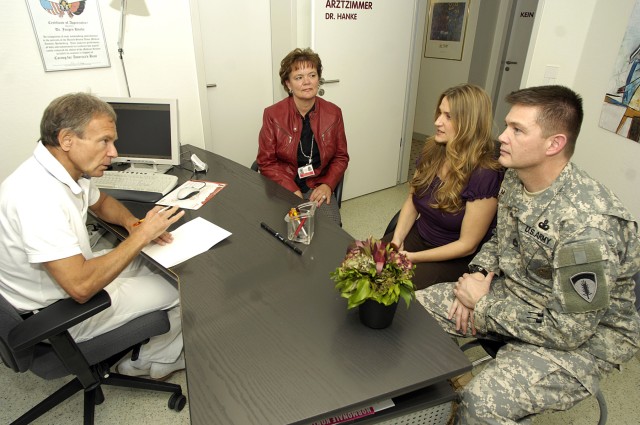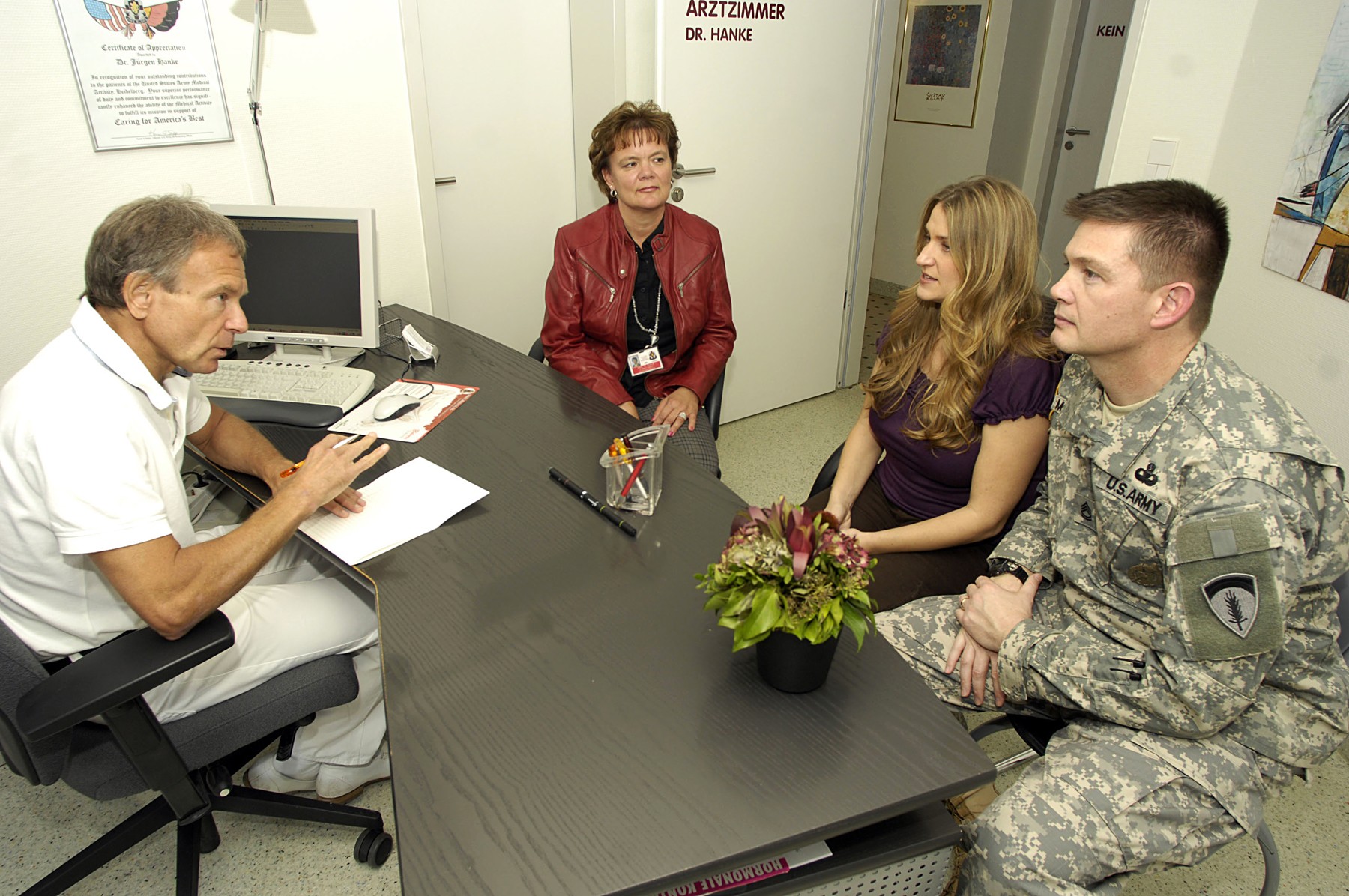
HEIDELBERG, Germany (Nov. 12, 2009) -- Dealing with medical issues, from routine tests to major surgery or prolonged treatment, can often be daunting. For Americans receiving health care services in a foreign country, it can be downright intimidating.
In the mid-1990s, as U.S. forces in Europe began to draw down in earnest, so did the number of U.S. military medical facilities available to provide health care to Americans eligible for treatment, and increasing numbers of those patients began getting referrals for care in host-nation medical facilities, according to Europe Regional Medical Command officials. To help American patients feel more comfortable and confident about that care, ERMC developed the host nation patient liaison program.
"The idea is to ease the concerns of dealing with language barriers and cultural differences so patients only have to concentrate on healing," explained Lesley Lehwald-Verron, the lead patient liaison for ERMC in Heidelberg. "Being in a foreign nation hospital can be overwhelming for some. Not only is there a language barrier, but there are also differences in a German hospital that Americans don't expect. Liaisons are there simply to overcome those issues and to help make the stay for the patient be as hassle-free as possible."
Lehwald-Verron, who has been a patient liaison since pretty much the beginning of the program in 1995, suggested patients visit the ERMC Web site and download the program brochure, which details the services patient liaisons offer and what patients can expect in host nation hospitals.
"Simply put, we are here for the patients. Patient liaisons visit every American patient each duty day and they will also ensure that patients have information on how to contact the patient liaison during non-duty times. A patient liaison is on call in every community for emergencies after hours and on weekends. Americans under care in host nation hospitals may contact a patient liaison any time for assistance," she said.
Lehwald-Verron said patient liaisons offer the dual benefit of fluency in language and medical terminology. "All patient liaisons are fluent in English and the host nation language, and since they have a general understanding of health care terms and practices, they can assist patients when talking to hospital staff or administration," she said.
As referral to host nation care has grown, so has the number of liaisons available to assist Americans. Many actually work full time in commonly frequented medical facilities in the host community. For example, the patient liaison staff serving the Heidelberg community recently increased to six, and Lehwald-Verron said a patient liaison has been permanently embedded during the work week in two local facilities in which Americans routinely receive care -- the Heidelberg University Hospital Kopfklinik and the Krankenhaus Schwetzingen.
"Other communities have seen success with this approach, Lehwald-Verron added. "Having a permanent person in the hospital builds confidence in the program and also helps to build a better relationship between the hospital staff and the Americans."
One family in Heidelberg said they are extremely grateful for the support and relationship-building skills of the patient liaison that helped them through a recent experience getting care in a local hospital.
Deb Hickens's 17-year old daughter, Jessica, recently underwent major hip surgery. Hickens said she assumed that after the surgery her daughter would be prescribed pain medication, but found that German doctors often prefer holistic approaches to pain management rather than prescribing medication, especially for young patients.
"There are just some things we're used to or that we take for granted in the States, that are definitely different over here," said Deb Hickens. "I don't know what we would have done without our patient liaison, who helped bridged that gap for us. I am truly grateful to her. She handled everything quickly and professionally."
"Our choice was to let our daughter have suitable pain medication, yet we were having difficulty convincing hospital staff. As soon as I explained the situation to our patient liaison, Ms. Gabriele Aupke, she got in touch with our doctor and resolved everything quickly," Hickens explained.
"Our patient liaison was much more than just a translator. She genuinely cared about us and handled everything professionally and diplomatically. Now, after it's all said and done, we have a better understanding of German medical practices, (and) I think they have an appreciation for Americans' expectations of standards of care."
As the patient liaison program has grown over the years, Lehwald-Verron said, she has seen that kind of a positive relationship develop between the American and German medical communities. "The idea of the permanent liaison position and increased staff also helps to increase the comfort level of both sides. Our presence is certainly welcomed by hospital staff and medical personnel alike," she said.
Dr. Juergen Hanke, chief of obstetrics at the Sankt Elisabeth Klinik in Heidelberg, agrees. "The patient liaison program helps in so many ways. I think there would be so many more objections and concerns between the Americans and us if it were not for the liaison," he said.
Hanke, who said he has seen many American clients and patient liaisons in his 10 years at St. Elisabeth's, called the liaison program a benefit for doctor and patient alike. "It really does make the patient more comfortable, and it makes my job so much easier. For example, there are different procedures for registering the birth of an American child and we're not so up-to-date on the requirements, so the patient liaisons can help guide the new mother to make sure everything is done properly. With less worries, patients and doctors can concentrate on health care."
Jorge Caballero is a physician's assistant with Special Operations Command at the U.S. European Command headquarters in Stuttgart, Germany. While hospitalized in a local treatment facility recently, the retired captain learned firsthand how critical the liaison system he recommends to his patients is to the healing process. "It is such a good feeling to know that someone is around to help you when you are put in an unknown and potentially scary situation," said Caballero. "I always tell my patients to be sure to use the patient liaisons when dealing with host nation facilities, just for that added comfort factor. And now I can speak from experience as to how helpful and comforting they are. I really can't say enough good things about them."
Lehwald-Verron said liaisons are dedicated to helping their patients, and encouraged those seeking treatment in host nation facilities to call them for whatever assistance they need. "Our goal is to have the patient just focus on healing, and not to worry about any billing or any other issues while at a host nation hospital," she said. "We are here for whatever they need, and they can call us any time, even after duty hours. We often answer questions with nurses or other staff over the phone for patients. We also can help patients out with any translation or billing questions for follow-up care or other type of office calls."
ERMC is working to expand the liaison program to provide more services to beneficiaries, and plans to implement a host nation patient liaison outpatient pilot program in the coming months, said Dr. Evan Steil, ERMC Clinical Operations staff member who manages the Host Nation Patient Liaison program.
"That plan specifies hiring 20 additional liaisons to assist beneficiaries who request support for initial outpatient visits, pre-operative visits for surgery, and possibly other significant procedures such as radiologic intervention or obstetric assessments which are done in the outpatient setting at a host nation hospital or clinic," said Steil.
Other services, such as language aids, medical document translation, and guidance in finding and using local host nation health facilities, are available online at the ERMC Web site and through installation clinics and Tricare service centers.
To download ERMC's patient liaison program brochure, go to ermc.amedd.army.mil.

Social Sharing